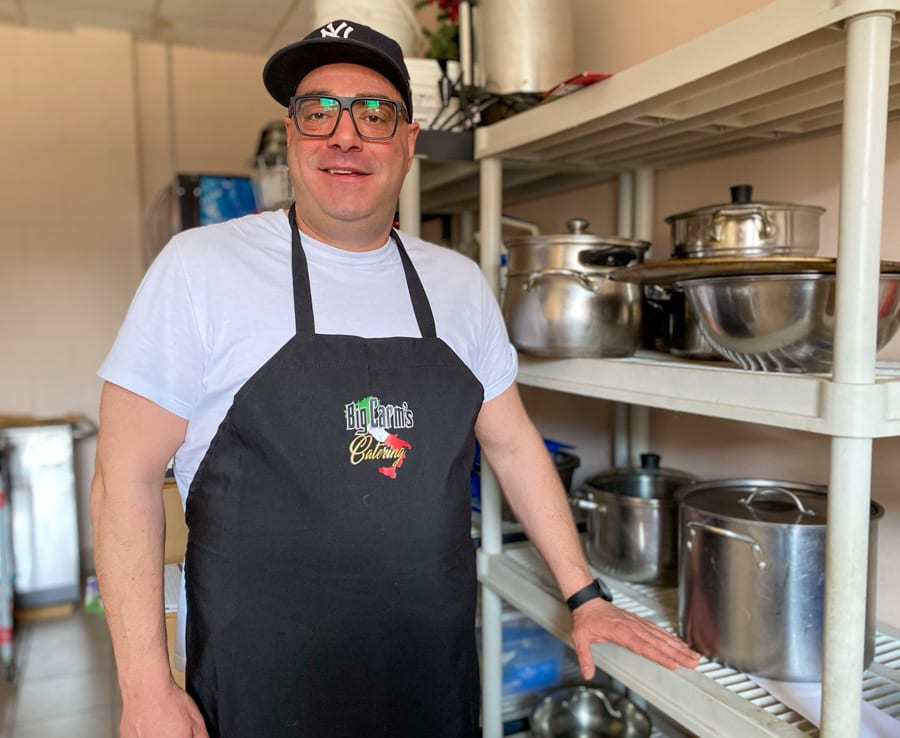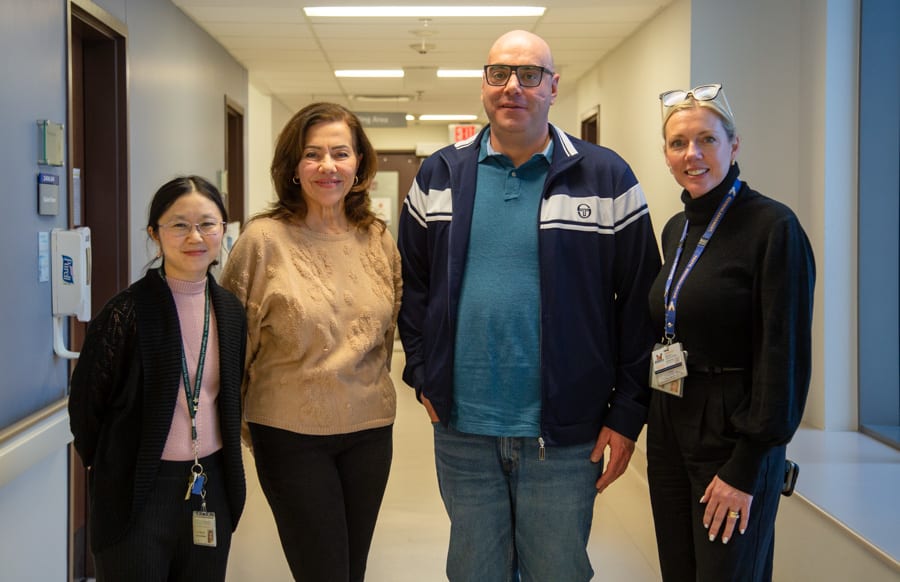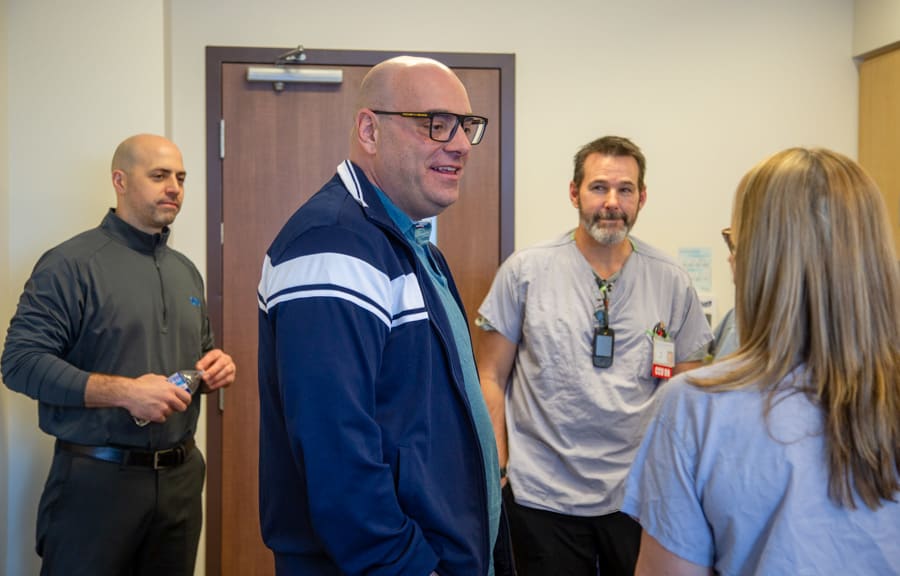This is an opinion column by Niagara Health Communications Specialist Tiffany Mayer, published in the St. Catharines Standard, Niagara Falls Review and Welland Tribune.

Carmine Posteraro stands in the storage area of his newly rented café that he plans to open this spring in Welland. Posteraro was one of Niagara Health’s first patients with COVID-19. He returned to the Marotta Family Hospital intensive care unit recently to share about his life five years later.
It’s rare to hear someone say that COVID-19 may have been the best thing to ever happen to them.
But nothing about Carmine Posteraro is commonplace.
The Niagara Falls resident is a stand-up comedian, using humour to heal from his experience. He opened Big Carm’s Catering, a successful food service business after visiting Italy when he was well enough to travel. There, he served as understudy to his aunt and mastered her meatball recipe. Now he’s fine-tuning a business plan to open a café Welland in May.
Posteraro also overcame substance use disorder, which started after a football injury as a young adult. And he credits the virus that upended the world -- and nearly took his life -- for helping him do it all.
“I often wonder if I would’ve relapsed if it wasn’t for COVID,” Posteraro, 44, said. “Something woke me up after that experience.”
That experience started on March 25, 2020, when Posteraro tested positive for COVID-19. With the virus ravaging his lungs, he was taken by ambulance to the Niagara Falls Hospital soon after.
As one of Niagara Health’s first COVID-19 patients, Posteraro arrived to find a seven-strong care team waiting for him, including childhood friend and respiratory therapist Peter Morrone. It was so early in the pandemic, none of them wore the masks and gowns that would soon become their armour in a years-long battle.
“I shouldn’t be here right now. But I am. And I’m going to make the most of it.”
Nearly five years after the pandemic began, Posteraro and his mother, Rena, returned to share his journey to recovery with those who saved him. He spoke at the Intensive Care Unit (ICU) Survivorship Speaker Series, a program started by ICU physician Dr. Joyce Lam to uplift staff by highlighting former patients whose lives were changed by their care.

From left: Intensivist Dr. Joyce Lam, Rena Posteraro, Carmine Posteraro and Clinical Manager Francie Davidson at the Marotta Family Hospital in January 2025.
Before he got sick, Posteraro had been six months into a one-year addiction recovery program in London, Ont. When the virus started to surge locally, the facility gave residents the option to leave for what was expected to be a two-week shutdown. Posteraro took the chance to go home.
His father, Dominic, picked him up on a Saturday. They shared an order of fries on the drive and used the same cell phone.
Days later, Posteraro got a call from someone at the program urging him to test for COVID-19. Around that time, he began logging a fever, and had isolated himself in his parents’ basement. He emerged pale, sweating, coughing up a black phlegm, and positive for the virus.
Rena called for an ambulance. Posteraro resisted at first, but walked over to paramedics when they arrived to transport him to hospital.
“I didn’t want to go,” he said. “I had overdosed before and been in an ambulance a bunch of times. I was done with all that. But I’m glad I did go.”
Providing care in a different world
With physical distancing and no-visitor policies in place at the hospital, Rena couldn’t go with her son. She waited for an update, which came from a doctor a few hours later.
“(He) said, ‘I have some bad news and we don’t think he’s going to make it,’” Rena recalled. “I was shocked, just shocked.”
Shortly after arriving at the hospital, Posteraro was in an induced coma and intubated so a ventilator could keep him breathing. The next thing he remembered was waking up 12 days later at the St. Catharines Hospital. He was disoriented and agitated.
During that time, he also experienced acute kidney failure and required dialysis.
“I was tearing stuff out. I remember feeling really bad about that and then in subsequent days, I calmed down. I didn’t sleep much,” Posteraro said. “I remember one of the nurses telling me I was starting to hallucinate because I hadn’t slept in a while and I said, ‘I just slept for 12 days.’”
Adding to Rena’s anguish, Dominic also tested positive for COVID-19 and was admitted to hospital on March 30. He would spend a week there recovering from fever and pneumonia before going home.
Through it all, care teams kept her updated on their conditions, and despite the uncertainty, one thing was clear. Those care teams were exceptional.
In the ICU, nurses Jim and Jane Hyman were Rena’s lifelines – voices on the other end of the phone providing her with daily updates. Nurse Marina Savic helped Posteraro call with the good news when he was taken off the ventilator.
Doctors monitored him closely, adjusting treatments to give him the best chance of survival. Posteraro would remain in hospital for 22 days, rebuilding his strength with physiotherapists so he could sit up, and then walk. He had to learn to hold utensils again and lift his arms above his head.
Recovery, healing and life after COVID-19
“The staff never made me feel like just another patient,” he said. “They treated me like I mattered, like I was worth saving.”
His mother echoed that sentiment. “They saved my son’s life,” she said. “And they did it with such care and compassion. I’ll always be grateful. And they saved me. In that world of unknowns, I will always be grateful you were here.”

Carmine Posteraro, centre, returned to the Marotta Family Hospital intensive care unit in January to visit with some of his care team from when he was admitted to hospital in March 2020 with COVID-19.
Still, recovery was slow. Months later, Posteraro remained plagued by fatigue. He didn’t know how much he’d recover or if he’d ever work again.
A year and a half later, he grew tired of wondering. He started walking instead and joined a fitness group.
Posteraro wasn’t just recovering. He was healing. That’s when he started dabbling in stand-up comedy and headed to Italy to learn his family’s kitchen secrets.
Today, he’s in the best shape of his life, and living on his terms. Every time he takes the stage for a comedy act or serves a Stromboli, it’s as much a public service as an indicator of how much he’s overcome the incredible odds once against him.
“I got a crazy story and I can either dwell in the past or I can make light of it and move on, and try, through comedy and laughing, to share my message with somebody else who might be out there struggling,” he said.
“I shouldn’t be here right now,” he added. “But I am. And I’m going to make the most of it.”

